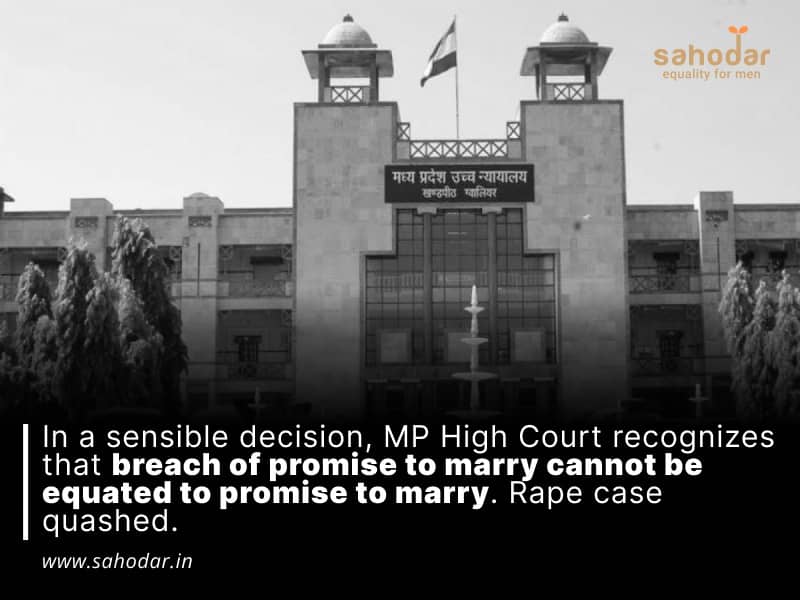The Gwalior bench of the Madhya Pradesh High Court has ruled that a rape case cannot be sustained based solely on a breach of promise to marry. Justice Deepak Kumar Agarwal stated that a false promise to marry must be made with the intention to deceive a woman to invalidate her consent. The court drew a distinction between a mere breach of promise and the act of giving a false promise to marry. While the latter can vitiate consent obtained under a misconception of fact, the former cannot be considered a false promise. The court’s decision was based on the precedent set by the Supreme Court.
Under Section 482 of the CrPC, a petition was filed challenging the criminal proceedings and chargesheet brought against the petitioner for an alleged violation of Section 376(2)(n) of the IPC, which deals with the punishment for rape. The prosecution alleged that the petitioner and the complainant were in a live-in relationship and that the petitioner had promised to marry her once he obtained a job. However, in July 2021, the petitioner married another woman, leading to the filing of a complaint.
During the hearing, the Petitioner’s Counsel argued that the complainant had lodged the FIR with malicious intent to gain an unfair advantage. The Counsel further contended that since the prosecutrix had been in a long-term relationship with the petitioner, her consent was not obtained through misrepresentation.
The Court referred to several previous decisions of the Supreme Court and concluded that, for the purposes of Section 375 of the IPC, a woman’s “consent” must be the result of an active and deliberate thought process in relation to the proposed act. To establish whether a woman’s consent was vitiated by a “misconception of fact” arising from a promise to marry, two conditions must be satisfied. Firstly, the promise of marriage must have been a false one, made in bad faith and with no intention of being fulfilled at the time it was made. Secondly, the false promise itself must be immediately relevant or have a direct connection to the woman’s decision to engage in sexual activity.
The Court noted that the Supreme Court had distinguished between rape and consensual sex in the case of Dr. Dhruvaram Murlidhar Sonar v. Naval Singh Rajput and others. In such cases, the Court must carefully examine whether the complainant actually intended to marry the victim or had malicious motives and made a false promise only to satisfy their lust. If the accused did not make the promise with the intention of seducing the complainant into engaging in sexual activity, such an act would not be considered rape. There may also be cases where the complainant engages in sexual activity due to her love and passion for the accused, rather than solely due to the accused’s false promise. Similarly, if the accused was unable to marry the complainant despite having the intention to do so, due to unforeseen circumstances beyond his control, it would be a different matter. However, if the complainant had malicious intentions and ulterior motives, it would be considered rape. The Court held that a consensual physical relationship between the parties would not amount to an offence under Section 376 of the IPC if there was no false promise made with the intention of deceiving the complainant.
The Court noted that in this case, it can only be considered a breach of promise at most, and not a case of obtaining a promise through fear or misconception of fact. The complainant stated that she had willingly entered into a live-in relationship with the petitioner and only lodged a complaint after discovering that he had married another woman. The Court stated that this was not a case of forced rape and there was no evidence of psychological pressure being exerted on the complainant. Therefore, even if the allegations made in the complaint are taken at face value, they do not make a case for rape against the petitioner. The Court quashed the chargesheet and criminal proceedings against the petitioner, concluding that there was no basis for his prosecution.
Note: In our opinion, at last, the court decided the matter based on some sense in this case. It a well-reasoned and quite a sensible decision.
Source: https://www.livelaw.in/news-updates/mere-breach-promise-not-equivalent-giving-false-promise-marry-madhya-pradesh-hc-quashesrapecase-224838

